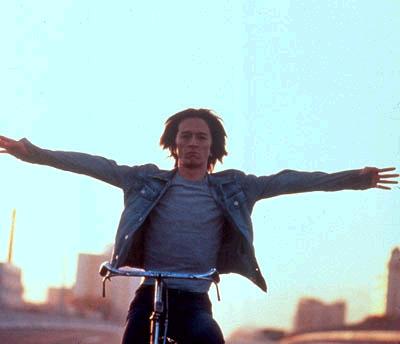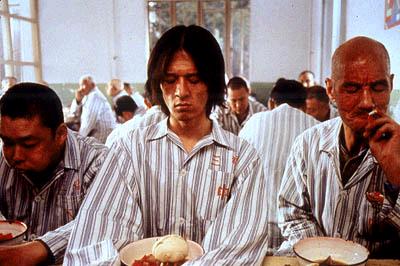

Things do not get more autobiographical than the events in Quitting. The movie is based on the life of actor Jia Hongsheng, and Jia and his family play themselves. Oddly enough, director Zhang Yang (Shower, Spicy Love Soup) and Huo Xin (Shower) co-wrote the script, but everything else is about as real as it gets. Jia's parents play themselves. Doctors and mental patients play themselves. Jia even addresses the camera, speaking to an off-camera interviewer giving strikingly personal accounts of his downfall. Quitting traces an approximate four-year period in the late nineties, when Jia was just emerging as a rising actor and discovered heroin.
His parents worry so much about him that they surprise him and move back in with him. Jia's father even retired early to care for his son. Needless to say, he is not happy about the situation. Jia is nothing but a jerk to them, yelling at them and taking advantage of them at every opportunity. They do nothing but give him space and show him unconditional love. As actors, they do a decent job for people with no prior screen experience (however, they are stage actors). Their freshness makes some of the scenes more intense. They are reliving a painful part of their lives on screen for everybody to see. This is the strongest point of Quitting, Zhang's ability to show the ruinous effects that drugs like heroin can have on the user and the people around him/her.
Jia's performance is a little more problematic. He does a magnificent job of conveying the perils of addiction as well as the consequences, but fails to let the viewer glimpse inside his mind. He is standoffish to his parents, and this comes across to the viewer also. All the external effects are there, but nobody ever gets to see what exactly is happening inside his mind. He is full of rage towards himself and everybody around him, but the 'real' source of that rage is never clear. So instead of a story told from Jia's point of view, Quitting becomes more of a journey for Jia's family. Zhang knows Jia well, since he directed Jia in a stage production of Kiss of the Spider Woman, which, incidentally, was where Jia's experiences with drugs began.
The stage also takes the spotlight. A few times in Quitting, Zhang pans the camera back to show that some of the scenes are actually taking place on a stage, in front of an empty audience. Surprisingly, this does not distract the viewer from what his happening within the film. It's like making the film was a cathartic experience for Jia and his parents. They need to relive the pain they experienced to serve as a reminder for it not to happen again.